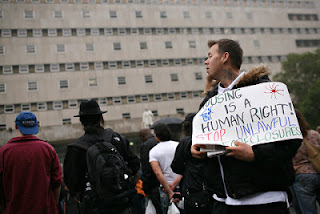The risk of using the word evil is that it distances, it makes it seem foreign, alien, something so caustic and disgusting that it defies address or redress. How can we agree with the assessment and evil and do anything but run?
 I refuse to run. Though I am spurred to the door, to the high cliff-- the lonely high cliff of the moral high ground, as I am reminded by my dear sister-in-law-- by calling out evil, it does no good at all for the world. I remember well the prayer of my youth-- Do you reject Satan and all of his works, all of his empty promises? I do. I want to. But what a fabulously un-nuanced understanding of evil, this horned progenitor of all that sickens, wilts, destroys! What an easy easy thing to move away, to stamp out, to sequester and shun!
I refuse to run. Though I am spurred to the door, to the high cliff-- the lonely high cliff of the moral high ground, as I am reminded by my dear sister-in-law-- by calling out evil, it does no good at all for the world. I remember well the prayer of my youth-- Do you reject Satan and all of his works, all of his empty promises? I do. I want to. But what a fabulously un-nuanced understanding of evil, this horned progenitor of all that sickens, wilts, destroys! What an easy easy thing to move away, to stamp out, to sequester and shun!This reminds me of my own rejections, reminds me of the persistent belief in myself that I am sick, wrong. This reminds me of the numbness of getting kicked to the curb as a teen for my queer love. Who was evil, then? The family who rejected, or the freakish desire rising in me like so much thorny invader on the quiet landscape of my heterosexual family? When we see evil as something outside of our human community, and therefore outside of our responsibility, then the risk of splitting raises its terrible head.
For who does not desire the gun? For who does not harbor the murderer in their heart? For who does not ache the lonely moment before despair? For who does not reject the uncomfortable, the odd? For who lives wide open, with love only, with hope only, with good only?
If I reject the evil in the acts of war, in the acts of massacre, as something that does not rest in a part of me, something that does not live in my human potential, then I am losing my own humanity. I am losing the chance for compassion, for vulnerable love, for heart-changing growth. Is it not the revolution of free will that spurs us to greatness? Is it not my own ability to choose life that gives it value?
When we split ourselves off from these (I'll call them negative) parts of ourselves, all kinds of f-ed up stuff happens, not least of which is the roots of our most pernicious ills-- beliefs, actions, policies that support a view that those people are the one's with the problems, and the unhappy result that usually those people are the non-dominant, the non-white, non-male, non-Christian, non-owning class, etc. etc. Racism, sexism, heterosexism-- these ideas that somehow there is a class of less than human, where all of these sentiments rest, is the result of the mind of the split consciousness.
So, for myself, I am looking for a better answer to the impulse of the gun in me. I am looking for a way to hold an understanding of evil that does not condemn me, or condemn my neighbor. As a Quaker, I hold that there is that-of-God in everyone. I also hold that there is that of evil in everyone. It is in this human potential that I find the most awe, and so much sadness. But if I think that I cannot hold all of this in my understanding of human, than I perpetrate a deep injustice, and risk missing the joy of what true healing and community can be.

So let us practice our 28 mitzvahs, kind acts, remembrances for all of those who died. For all of those potentials that were never expressed, or that were. Our mourning is large, and should be larger. Let us truly see each other as the full humans we are, and let us love one another and ourselves for our dance and struggles with evil. We can reach the other side of those struggles, where love wins and we end the splitting of self that allows evil to flourish. For this, I pray.
Amen.


















